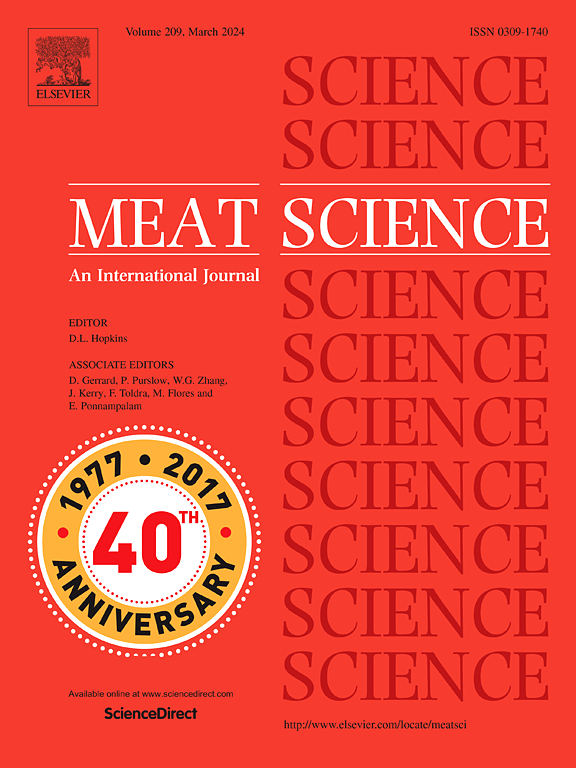饲粮中添加肉桂酸对粤东黑猪生长性能、肉品质、肌肉发育和抗氧化能力的影响
IF 6.1
1区 农林科学
Q1 Agricultural and Biological Sciences
引用次数: 0
摘要
肉桂酸是一种具有抗菌、抗炎和抗氧化特性的天然生物活性物质,作为一种新型饲料添加剂具有潜在的应用价值。本试验旨在研究饲粮中添加钙对粤东黑猪生长性能、胴体特性、肉品质、肌肉能量代谢和抗氧化能力的影响。选取初始体重为35 kg的3月龄粤东黑猪100头,随机分为对照组和0.3 g/kg CA组,每组50头。与对照组(CON)相比,饲粮中添加CA可提高平均日增重(P < 0.05),降低饲料系数(FCR) (P = 0.056)。此外,饲粮中添加CA提高了大理石纹评分,增加了胸最长肌(LT)肌纤维横截面积(P < 0.05)。重要的是,CA的补充通过增加肌球蛋白重链(MyHC)的表达和蛋白质沉积来促进肌肉肥大。肌纤维类型在对照组和CA组之间没有变化。CA组血清葡萄糖降低,线粒体合成促进,肌肉乳酸和ATP含量升高(P < 0.05)。此外,CA增加了肌肉中抗氧化基因谷胱甘肽过氧化物酶1 (Gpx1)和过氧化物酶1 (Prdx1)的表达,但对血清丙二醛(MDA)水平、总抗氧化能力(T-AOC)和谷胱甘肽过氧化物酶(GPX)活性无显著影响。综上所述,添加脂肪酸能提高月东黑猪的生长率和肉质,促进肌肉发育、能量代谢和抗氧化能力。本文章由计算机程序翻译,如有差异,请以英文原文为准。
Effects of dietary cinnamic acid supplementation on growth performance, meat quality, muscle development and antioxidant capacity of Yuedong black pigs
Cinnamic acid (CA) is a natural bioactive substance with antimicrobial, anti-inflammatory and antioxidant properties, which has potential value as a novel feed additive. This study investigated the effects of CA supplementation on growth performance, carcass characteristics, meat quality, energy metabolism and antioxidant capacity in muscle of Yuedong black pigs. A total of 100 3-month-old Yuedong black pigs with an initial body weight of 35 kg were selected and randomly assigned to two treatment groups: the control group and the 0.3 g/kg CA group, with 50 pigs in each group. Compared with control group (CON), dietary supplementation of CA increased average daily gain (ADG) (P < 0.05), while tended to decrease feed conversion ratio (FCR) (P = 0.056). Furthermore, dietary supplementation of CA improved the marbling score, and increased cross-sectional area of muscle fiber of the longissimus thoracis (LT) (P < 0.05). Importantly, CA supplementation promoted muscle hypertrophy by increasing myosin heavy chain (MyHC) expression and protein deposition. The myofiber types were unchanged between control and CA group. CA group showed reduced serum glucose, promoted mitochondrial synthesis and increased lactic acid and ATP content in muscle (P < 0.05). Additionally, CA increased the expression of antioxidant genes (glutathione peroxidase 1, Gpx1 and peroxiredoxin 1, Prdx1) in muscle, but no significant difference was observed in malondialdehyde (MDA) levels, total antioxidant capacity (T-AOC) and glutathione peroxidase (GPX) activity in serum. Overall, CA could improve growth rate, meat quality, and promote muscle development, energy metabolism and antioxidant capacity of Yuedong black pigs.
求助全文
通过发布文献求助,成功后即可免费获取论文全文。
去求助
来源期刊

Meat Science
工程技术-食品科技
CiteScore
12.60
自引率
9.90%
发文量
282
审稿时长
60 days
期刊介绍:
The aim of Meat Science is to serve as a suitable platform for the dissemination of interdisciplinary and international knowledge on all factors influencing the properties of meat. While the journal primarily focuses on the flesh of mammals, contributions related to poultry will be considered if they enhance the overall understanding of the relationship between muscle nature and meat quality post mortem. Additionally, papers on large birds (e.g., emus, ostriches) as well as wild-captured mammals and crocodiles will be welcomed.
 求助内容:
求助内容: 应助结果提醒方式:
应助结果提醒方式:


